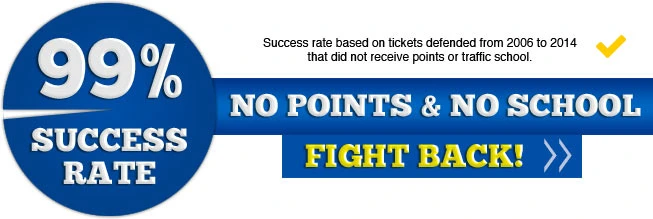Below are just a few of our happy ticket clients who think we are the BEST!
Don’t Pay That Traffic Ticket
Let Us Fight Back For YOU!
Did You Know?
Attendance at Traffic School will appear on your driving record – this is one way your insurance company calculates its rates.
Your rates can rise as much as 30% or more for only one ticket.
Your driving record is a matter of public record — therefore, it can affect other insurance rates as well as your credit rating and your employability.

7 Reasons To Fight A Traffic Ticket
1. Points added to your driver license:
Florida has a point system to measure how good (or bad) a driver is and point limit at which they will suspend and/or revoke your driver license. 12 points in 12 months and your license gets suspended.
2. Higher insurance payments:
Convictions, even if they carry no driver license points, make a motorist a greater risk to insure and therefore subject to higher insurance rates.
3. Driver license suspension:
Either due to a specific type of violation or an accumulation of points, convictions can lead to suspension of your driver license. Failure to take care of a traffic ticket in a timely fashion (30 days) may lead to driver license suspension as well.
4. Driver license revocation:
Convictions for certain types of violations can lead to full revocation of your driver license. Driver license revocation usually means you’ll need to reapply for a license from scratch and/or you may be unable to get a license for 2 or even 5 years.
5. Unemployment:
If you drive under an employer’s insurance policy, accumulation of points makes you a greater insurance risk and could result in your termination. Any problems at all with a Commercial driver license can quickly and easily lead to employment issues.
6. Arrest Warrants:
If you fail to answer a traffic criminal ticket on time, some courts will issue a warrant to compel you to appear.
7. Permanent Criminal Record and/or Imprisonment:
While most traffic tickets are considered violations, more serious offenses may actually be considered misdemeanors. Misdemeanors are criminal offenses and may affect your employment, immigration or other status. Some are punishable by jail.
7 Things About Traffic Tickets You Probably Did Not Know
1. Red Light Cameras: Two types of evidence are obtained. First, a series of still shots are taken which show the license plates of the car and the occupants of the vehicle. Second, a 12 second video is taken, showing approximately 6 seconds before and 6 seconds after running the red light. You may view your red light video prior to going to court. Your original notice will have a phone number to call to arrange an appointment. However, in Florida, you do NOT get points on your license if you go through a red light and you are caught on camera with no police officer present.
2. Motorcycle Officer v. Traffic Officer who drives a car: Motorcycle Officers normally specialize in traffic enforcement via radar as well as target specific problem areas of the city where collisions occur. Their ability to maneuver easily makes them ideal for this purpose. They also work special events, where space and rapid response is critical. Traffic Officer assigned to a car also works traffic enforcement, but spends the majority of his time as an investigator of collisions. Such officers also work Hit & Run collisions, as well as more serious accident scenes.
3. Errors on a Traffic Ticket: Courts will often excuse minor errors on a ticket. A misspelled name, incorrect address or difference in opinion on whether your car is aqua or green in color will not result in a dismissed ticket. Conversely, a major error such as citing the wrong statute, radically misidentifying your vehicle or listing the wrong highway as the site of the violation should provide justification to dismiss the ticket. However, every case and every Jude is different and uses different standards so no two cases are the same no matter what the facts.
4. Signing the Traffic Ticket: Not signing a ticket can lead to other charges. Signing for your ticket merely means that you will pay the fine or plead not guilty and show up in court. If your name was spelled wrong, that could be used in court with other anomalies to introduce reasonable doubt in the officer’s testimony. However, if all the information relevant to the stop is correct, a spelling error will not result in the dismissal of the charge(s). Also, if you don’t sign the ticket, you can be arrested on the spot. Always sign the ticket.
5. Defective Speedometer: The court might consider a defective speedometer a mitigating circumstance, but it’s likely you will still be found guilty. You can’t blame the broken speedometer for your speeding.
6. Show me the radar/laser reading: This is not required in most jurisdictions. Also, whether the officer allows you to see the speed reading has virtually no bearing on your case. Officers can lock on radar readings and leave them on to display to any hapless victim, even though it was not their vehicle that registered the displayed speed.
7. The Officer was Rude: If the officer had to follow you for a quarter-mile or more until you noticed him in your rearview mirror, he may be unhappy. You were guilty of “contempt of cop,” which happens when you don’t do whatever it is an officer wants you to do. Regardless, it is not a good idea for you to act in a similar manner. Rudeness of the cop is not a defense, so give a mad dog two bones and be extra nice.


